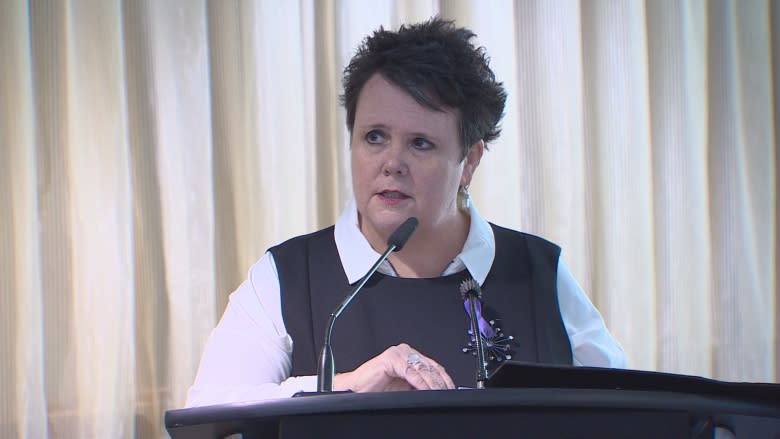Halifax remembers Montreal's École Polytechnique victims
Red human-sized silhouettes of two Nova Scotia murdered women stood before a mostly female crowd who gathered in downtown Halifax Tuesday to remember the 14 women killed at Montreal's École Polytechnique 27 years ago.
Doreen Bernard, a Mi'kmaq elder from the Sipekne'katik First Nation, prayed for the women's families and for missing and murdered Indigenous women, men and children across Canada.
"We remember and honour our sisters in spirit, our loved ones, our grandmothers, mothers, sisters, daughters, aunts, nieces, wives, partners and friends," Bernard prayed.
Gender violence can happen anywhere
In an interview, Bernard said marking the day of the École Polytechnique shooting opens up the eyes of society and helps it understand that gender violence happens and that it can happen anywhere and to anyone.
"It's really important to not let their memories go, let the families know that they did not die in vain, they died for a reason to raise … awareness throughout Canada, throughout the world, how our women are being treated," she said.
Awareness is also the aim of the red silhouettes. They represent Paula Gallant, a Nova Scotia school teacher murdered by her husband, and Linda Boudreau, who was killed by her husband in Dartmouth.
Joanne Bernard, the provincial minister responsible for the Advisory Council on the Status of Women, called the École Polytechnique shooting, where a gunman professing to hate feminists opened fire at the school, one of the defining moments in the history of Canada.
A shared responsibility
She remembered exactly where she was when she heard news about the massacre. At the time, she was watching TV with her father and was five months pregnant.
The minister recalled, "And at the time, I didn't know I was having a boy and I remember thinking if I'm pregnant with a girl, what kind of world is she going to grow up in and what will I need to do to protect her?"
Ending violence against women is everyone's responsibility, she said.
Violence against women is a worldwide problem that affects women of all ages, ethnicities, races, nationalities and socio-economic backgrounds, said newly appointed Senator Wanda Thomas Bernard.
Challenging sexism culture
Touching on this year's "your actions matter" theme for the National Day of Action on Violence Against Women, Wanda Bernard challenged each person in the room to pause and ask themselves what they are doing to stop gender-based violence.
"What am I doing to challenge the culture in my family, my community and or my social circle that allows the culture of sexism, the culture of misogyny, the culture of racism and any and all forms of oppression to thrive?" she asked.
'Long continuum'
Heather Byrne, executive director of Alice Housing, a community-based agency that provides 18 safe homes for women and children escaping abuse, said it was important for her to be at the ceremony to represent the women who have lost their lives to violence and who continue to suffer from violence.
"There's a long continuum of what gendered violence and sexism looks like that's not always about being physically abusive to your partner," Byrne said. "There's all sorts of other ways that it shows up that people might not even be aware that it's happening in their own home."




